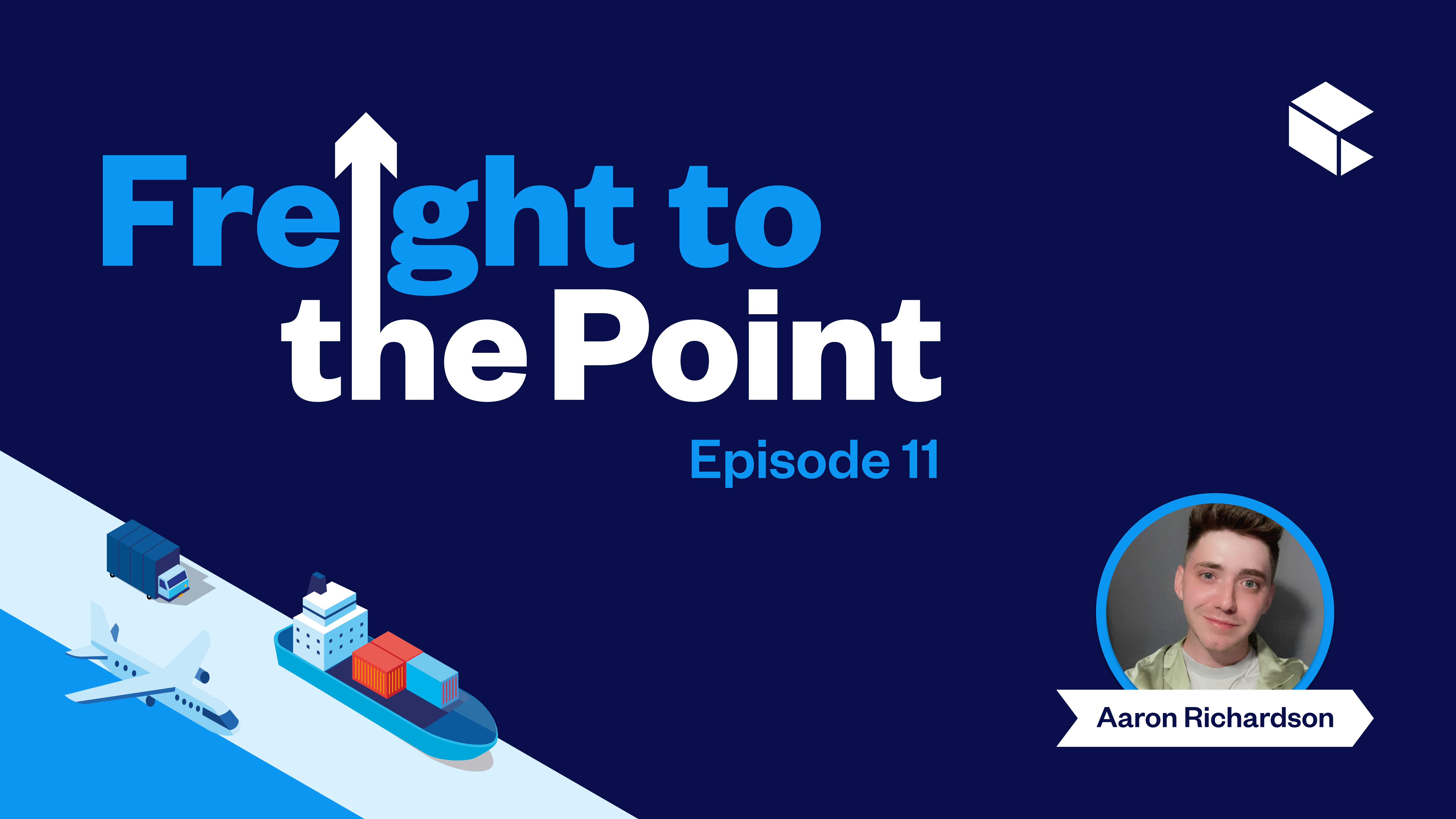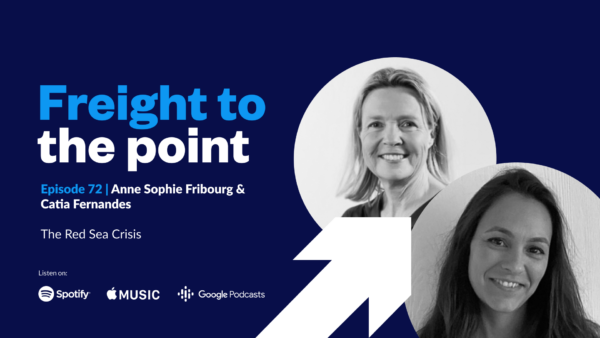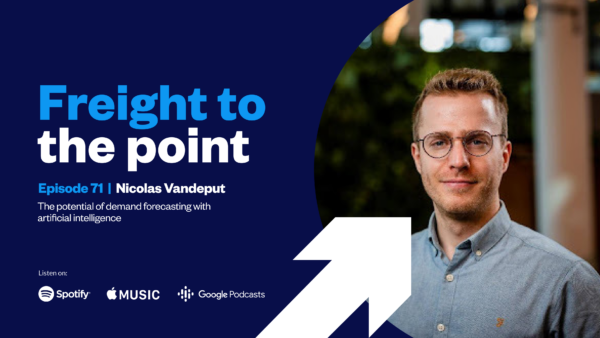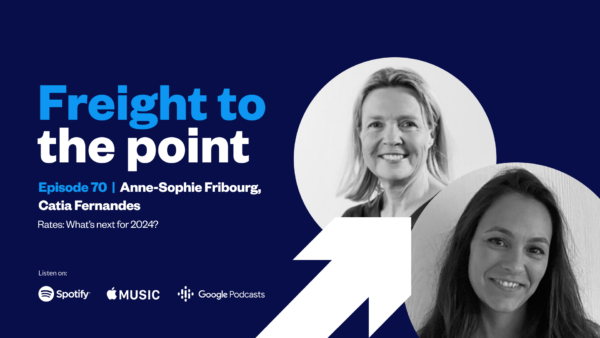Episode 11:
Navigating customs challenges with Aaron Richardson
See all episodes

What has been the biggest challenge for customs specialists in the past decade?
In this week’s episode of Freight to the Point, we’re joined by our very own Aaron Richardson, Customs Specialist at Zencargo to discuss the complexities of customs and how businesses can stay on top of the added customs legislation introduced over the past decade.
This episode explores:
- The challenges of navigating Brexit custom controls
- How customs brokers should be supporting businesses
- The value of building partnerships to drive business outcomes
Aaron Richardson
Aaron is a customs specialist at Zencargo. He focuses on clearance, providing guidance on evolving legislations, and partners with businesses to streamline customs processes
Resources
- How should you prepare for the UK Customs Declaration service migration?
- The Supply Chain Leader’s Guide to Brexit
 |
Hello, and welcome to Episode 11 of Freight To the Point, a podcast by Zencargo, I’m Helen Wood and today I’m thrilled to be joined by Aaron Richardson, the Customs Specialist from our team at Zencargo. Aaron’s been with Zencargo for a year now, and he’s been part of our customs team for that time. So he’s always focused on ensuring that the clearance of goods, whether it’s imports or exports runs as smoothly as possible through customs. He’s an expert, he knows a hell of a lot more about it than I do and we love working with him here in the Zencargo team. Thank you Aaron for joining us. |
|
Thank you very much Helena for having me, I’m really excited to speak about customs with you today.
|
 |
 |
Great. Well, let’s get freight to the point. Tell me a little bit about how you got into the industry. |
|
So did uni, didn’t really know what I wanted to do, I did a performing arts degree, so I was like, okay, maybe I don’t want to go into that anymore, let’s get an office job. And I was very locally near to DHL at East Midlands Airport, and what drove me to that? Obviously it’s a big company, I could see lots of progression there and also it’s very fast, fast paced because it’s all with air. So it was a nice break into the industry of seeing how stuff got cleared so quickly and all the ins and outs of customs and my first step into freight forwarding, so I accidentally fell into customs, but then I’ve never really left since, so it’s obviously fate, I was supposed to do customs.
|
 |
 |
And how many people in the customs world do you know that also have a performing arts background? I’m imagining that the apex of those Venn diagrams doesn’t go overlap that much. |
|
Yeah, probably not many to be fair, but in terms of I think trying to make customs a bit more exciting and explaining it to the customers in the less law way and simplifying it, I try and bring the dramatics to that and what can go wrong if you get customs wrong. And if anything, I think doing performing arts has helped me because I can work with any team in a very live and stressful environment because in performances, stuff goes wrong, right? And in supply chain things go wrong, so you’ve got to be fast on your feet to how to react to how to solve it quickly.
|
 |
 |
That’s super interesting. And I suppose because you’ve obviously started out, it’s interesting that being on the air side of the fence meant that I suppose things were moving quickly enough that you really had that first proper taste. But what is it specifically about working in the customs field that you really love that’s made you stay? |
|
I think every day’s different in customs and you can say that about any job and especially freight forwarding and supply chain in general, but in customs it’s a whole world. So even though I’m clearing stuff in the UK, whatever else is going on in the world, so obviously the Ukraine and Russia situation at the moment, that has a heavy impact, Brexit. It’s very political, so even though I’m actually doing a customs declaration, there’s lots of different things which I have to keep up to date with, of legislation. So it certainly keeps me on my toes.
|
 |
 |
I can imagine. And probably you’ve been working in the custom space in a… Let’s go with turbulent, with a very turbulent last few years. So over the time that you’ve been working in the customs field, what’s been the most significant change or challenge that’s impacted your role in the industry? |
|
Specific challenge I would probably say, and most custom professionals would say, would be Brexit. It was a challenge because all companies very much had to react, we didn’t really know what we were going into because the trade deal was signed so late and there wasn’t that much preparation in terms of businesses as such because Brexit kept getting delayed, so it was very reactive. I think the most challenging, specific thing was probably educating the customers, keeping that communication up and making sure we got rid of that backlog, and then looking how to improve stuff. So I think if anything, it was more educating businesses who didn’t have customs experience and really going down to the basics to get them to understand why you need the information, so… But we got through it, I think if anybody got through Brexit, they can get through any of the custom changes. So if you’ve got through that, I wouldn’t say throw in the towel yet, you’ve done Brexit, you can expand your business and trade anywhere. So it’s a positive, we’ve got over that big hurdle now.
|
 |
 |
Amazing. And how would you inform yourself? Because as you say,` so much of what’s going on in the wider world has an immediate impact on your ability to clear things through customs. So you’ve got to be really tuned into the geopolitical landscape, legislative changes, et cetera. How do you educate yourself and find all of that information? |
|
I think it’s really key to network. LinkedIn is a great resource of seeing blog posts, et cetera, and speaking to people in similar challenges and really connecting globally. One really good thing is joining webinars with the Institute of Export, HMRC webinars, BIFA. So all of the big bodies in freight forwarding are doing a lot of webinars and they’re weekly, for example, but then I’m jumping on courses like USA compliance, just to have that background knowledge because you never know when you’ll need it. So if anything, it’s sign up to any newsletters or any webinars which are going to be beneficial, but just be careful you’re not giving your time to the same company, which is going to go over the same topic again. So it’s being smart with what you read because you’re never going to know everything about customs, but you need to focus on what you need to know. So really making the right connections and attending the correct webinars.
|
 |
 |
And I can imagine, because obviously you are a customs expert in a business that has lots of people working across many elements of the supply chain, we’re a freight forwarder, digital freight forwarder. So when we work with our customers, they have the privilege of being able to speak to you and you’ve already done the homework, which means that you’re able to then give them the information that’s more pertinent to them. What’s your recommendation or your advice to maybe someone who’s listening to this podcast, it might be a shipper working in a retail business totally overwhelmed by the prospect of how to navigate, let’s call it Brexit, what to do next, should they be going and trying to educate themselves directly? Or would they be better coming to someone like you for advice? |
|
I think, yeah, it is good to try and do some self learning, but you can be very overwhelmed and you may read 20 pages of law and legislation compared to one slide deck or speaking to myself over the phone and simplifying an INCO term for example, so I think it is good to speak to your customs brokers directly. At Zen we’re more of a partner, so we want to instil confidence and educate the businesses and make them custom specialists in themselves, but only what they need to know with who they trade with and the trade loans. I think you’ve got to be careful if you’re working with a customs broker and they don’t give that level of support and they’re just your entry maker, then you’ve got to source someone else you need to speak to, so you may start looking to speak to the big tax firms and start paying for consulting advice when really, if it’s a simple question, your customs broker should support you.
So we’re more of a partner, we will give you that kind of training and basic understanding, but self learning only can get you so far. The HMRC website does offer a lot of information, but it’s quite heavy and quite hard to understand so speaking to someone like us, we can simplify it, break it down and answer the questions you’ve got per scenario as well. And we’ll advise you, we won’t make the decision for you because that’s always your decision, but we’ll guide you in terms of ensuring you stay compliant, but making sure you’re going to be profitable, and if there’s any trade deals you can claim preference for example, we will make you aware of those. So a lot of people are still not aware of the free trade agreement between the EU and the UK and they can claim preference for that, touchy subject because the Northern Island protocol may change that, but that’s another story.
But we’ll make you aware if we think we can save you money, we will educate you and if you want to know more on that topic we’ll go further. We won’t just say, “Oh, you need to do this, this, this,” we explain why, because you need to understand for your compliance and if you had a HMRC order, you need to understand why you claim preference on that, what evidence you’ve got and that you are compliant. So yeah, I think it’s finding that partner and then obviously you can do yourself learning behind, but if you’re unsure, speak to Zen, we know what we’re talking about.
|
 |
 |
Great. And let’s come back to the Brexit, we couldn’t not talk about it, but lots of businesses are still struggling through the changes that they’ve had to make regarding Brexit. I think there’s still confusion out there, from a customs perspective, what are the biggest challenges that you’ve faced during this transition period? |
|
I think if anything, probably the data. So if your data’s not in line and one key focus is HS codes, if you haven’t got the valid codes, your customs broker can’t really do much. So you as a business, you need to constantly review those, especially when they change, make sure you’re classifying correctly and if your HS codes are missing from your supplier on invoices, because we understand they won’t always put them on there because it’s got to get exported under a different one, then you could look at playing with skew data, which is something which Zen happily support on our digital platform, and provide their HS codes there as well. So that’s a big thing I would say probably 50% of invoices at most places I’ve worked at are missing HS code data, so that’s really key, get your data in line. Either put them on the invoice or give your broker data to play with so it can match up with commodity codes and then you shouldn’t see any delays.
|
 |
 |
Gosh, good practical tips there for some of our listeners. And I like the way that you spoke about the fact that working with Zencargo and the way that you do customs is partnership, right? So it’s about having that partnership relationship, which probably many of our listeners might not be used to because they might work with their existing broker in a different way, they might have a more transactional relationship. For example, how would you recommend someone goes about starting to build one of those trusted partnerships? |
|
I think always ask your broker, what can you offer me? Can you offer me consultancy? Or are you just going to do the entries? If you just want the entries and you don’t want that consultancy and partnership, then you know… And you know customs and that’s fine. But I think that’s the first question to ask, will you offer consultancy? If I’m a bit unsure how to export something, will you hold my hand? We work with a lot of startup companies ourselves so we’ve got that experience of holding people’s hands, advising them how to apply for customs authorisations, et cetera. So that’s one big question to ask. And then the other I would say is, have they got the transparency on their systems of when stuff’s going to be cleared? Can you tell easily? You don’t want to be bombarded through emails like, oh, can you clear this? And then your customs broker says, “Now this is cleared.” You’ve got to track that on an email basis.
You’ve got to ask, is there some kind of reporting system or on a platform where I can easily see it’s cleared? So that’s one big thing. And then I’ll say third thing, which is really important, is just touching on compliance in terms of actually being a partner, do they audit their own work or do they have an external auditor? So we are checking, are we doing our customs declarations correctly? Are they making the amendments within time? So that’s one really big thing if you want a partner, you want to make sure that they’re auditing their work and how they’re auditing their work because human error happens still in the customs world, but obviously with customs it’s related to finance, duty and VAT, so us at Zen, we 100% audit our work.
So every shipment we clear will get checked and if an amendment’s required, we’ll be open and honest with the customer, get it all amended and solve the solution there and then. Whereas other customs brokers may not audit all of their work, they may audit the percentage they have to keep their AEO status, which they’re keeping to their compliance to keep their AEO, but knowing that someone 100% audits their work and someone only audits 10%, maybe there’s going to be a few errors which aren’t spotted and HMRC are going to spot them instead. So it’s better for you to resolve that between you and your partner than HMRC going, what happened here on this declaration? And potentially getting a fine and stuff, it’s better to solve it there and then. So I think that’s a really key point which we haven’t touched on yet, how compliant is your customs broker? I’d like to say we are very compliant.
|
 |
 |
So get to know your broker, ask them the challenging questions, really check how compliant you feel they are based on their ability to audit, the depth at which they audit. Then let’s hope you build a partnership, you begin working together, hopefully that customs expert that you’re working, that partner is able to help you not only clear your goods, but actually clear your goods in a way that is going to be meaningful for your business. It might mean you save a little bit of money, it might mean that you move things more quickly, it might mean that there’s other outcomes that you’re able to drive. What do you think makes someone stay with a great customs partner? |
|
I think honesty and when things go wrong, which they do in supply chain and also support so that consulting. So I’ve got a query, I’m trying to classify something, I’m not really sure what it is and then we guide them in the right area and say, well, I don’t think that’s right. And maybe suggest, you need to speak to HMRC further and stuff. So I think it’s all about the support and not just being an entry maker, not just clearing it fastly, clearing it correctly and constantly communicating. So in terms of a big topic which is being spoke about in the moment, a big change in the customs for UK is the CDF change of the custom software which is used. So we’re communicating to a lot of our customers, if other brokers aren’t speaking about that, or you are trying to get information from them and they’re not really helping you, I’d question how prepared they are.
So it’s always keeping our customers up to date with what’s going on globally with customers, not every update I personally need to know, because that would be very boring and then they may as well do the entries themselves, but keeping them aligned with global customs updates, if it’s going to affect them as well. So if we’re not doing that, we’re not giving them the bigger picture I don’t think. So yeah, if you’re not getting customs updates at the moment, yes Brexit’s happened, I think it’s all gone a bit quiet on the custom side now and you don’t hear much, it’s very much a background part, which is why it’s so really exciting to obviously speak with you Helena about customs. Because normally if nothing’s going wrong in customs and nothing’s getting delayed, a lot of people don’t want to know, which is fair enough, the freight’s still going through, but there’s a lot people can learn from customs and potentially change business decisions to make them more profit and expand globally. So yeah, keeping our customers up to date, I think that will keep any partnership growing.
|
 |
 |
I’d love to hear that, I’d love to hear that. And you’ve said it yourself, things go wrong in this industry, things go wrong in all businesses and something we talk a lot about at Zencargo is ship happens. And we ask all of our guests on the podcast to tell us about a ship happens moment in their career, maybe it’s a story they tell friends, maybe it’s one that they use over the dinner table, so what’s your ship happens moment? |
|
Definitely wouldn’t use this one over the dinner table, but this was a shipment which needed to be cleared very quickly, only really found out when the customer was on the phone, so don’t know what happened, it’s obviously slipped through the net. But we had equestrian semen, which was held in customs. So it was a race horse, obviously supposed to be used to impregnate another horse to create the race horses we see at the grand national. And for me, this was like, when I first started customs, I was like, why is this so important? First I was like, wow, we import that? But then you think about you can import and export anything, so it was a bit of a shock, found it a little bit funny, I think naturally anybody would, but this was worth tens of thousands of pounds, the next horse which would be made from that was worth hundreds of thousands of pounds because it came from a great line of horses in the genes.
So yeah, that’s really when ship happens, really did because that wasn’t usable anymore, it was a time critical shipment. And yeah, there was no way of resolving it because it didn’t have the correct license and it was just held for too long and there was nothing we could really do. And it was just a bit like, wow, puts me on edge now. So now I see everything is time critical regardless what it is, takes me back and I’m like, if that was that, it’s not going to make that baby horse. So that’s something I will never forget.
|
 |
 |
Well I’m imagining you probably have some very good compliance lessons, if you ever need to move anything like that again, you would know how to get it through more quickly.
But that does sound like a real ship happens moment, thank you so much for sharing that, Aaron. And let’s talk a bit more broadly about the industry, because obviously we’re not on this podcast to only talk about customs, we talk more generally about supply chain. And supply chain as we know has gone through seismic change in the last few years, triggered by COVID, Brexit, everything else that’s going on in the world, the Russia, Ukraine situation. And we often talk about the fact that it’s almost like 20 years worth of change has happened within half a decade, but when you think about the future of the supply chain space, what would you like to see happening differently or changing?
|
|
I think an increase of automation, let’s not get rid of the humans entirely because we’re the ones who make the solutions and build that technology in, but automation, I think needs to be key if we’re going to increase our exports, our imports, focusing on the UK is border force strategy of a lot of businesses exporting a lot more in a single trade window. If there’s more exports, there’s only a limited amount of people which are going to go into customs and supply chain and operations in general, so if there’s any way to automate and move away from paper based systems, technology which can read invoices and packing lists and waivers and putting the data for you, I think that would be great. And we’re moving to a digitalised supply chain and it runs itself for you, and we’re only dealing then with the high level escalations or something which needs to be looked at by a human. And for myself, I think then we can become more partners to businesses.
We can give them those consulting times instead of doing that data entry and we can be a better partner and focus on the compliance side, okay? It’s AI integrated, the declarations, most of them are going through without human touch, but then focusing more on your auditing, focusing on compliance and then focusing on how we can clear stuff quicker after it’s all automated. How can we speed that up? What’s the next software out there which is best for our business? So yeah, not robots taking over yet, but automation I think is key to keep the cogs turning because we’re in that digital world now where everyone wants something next day. I think people are getting more used to COVID, you didn’t always get stuff next day. People I think want it now, eCommerce is a bit more on the rise even with everything going on. So yeah, if you can just push a button and it customs clear for you, that would be the dream, but I’m not doing myself out the job here, we still need humans.
 |
 |
Well, not yet, but I think it’s such a great point, isn’t it? And if the more automation we see in spaces like customs, well of course it reduces that manual error, it increases the throughput of items, so the capacity to actually process a whole load of stuff, and of course it will improve the speed. And it means if you’ve got that partnership relationship, the time that you spend working together as partners is less focused on the day to day, the processing, the list and much more focused on the outcomes, what that actually means for your business, the decisions you’re making and why you’re making them. So hopefully it’s better and rewarding for both parties there.
One final question for you before we move on to our quickfire round and it’s about your career and your personal journey and something that I think is very important in the supply chain space, and you’ve hinted at it as well is even though it’s vast, we’re heavily reliant on tooling, we’re heavily reliant on automation, but it’s a very human industry, full of great people. And it’s nice to call them out and to thank them, so is there anyone in your career journey so far who’s been a massive inspiration or that you’d like to give a shout out to?
|
|
There’s many. And I think without them, I wouldn’t have the confidence or stayed in customs because there’s a lot of self doubt when you first start in customs. So one of mine would be Cassandra Caminos who’s been a great leader, she’s gone off to work for IOE and now in a very big tobacco firm now, and she’s an inspiration because she spent many years like myself as a broker doing the entries and she’s gone on to go do consulting, getting involved in government trade talks. And she’s got that customs brain, which I wish I could just put in my head overnight, but the amount I’ve learned off her is incredible and I see her as a really inspirational leader and someone who’s a real go getter and she’s going to make a name for herself and I’m just so proud that in a very sometimes old, old boys club in supply chains and companies she’s worked at, she’s not let that stop her.
She’s a very strong woman, she can do this and she won’t let barriers stop her. And I’ve tried to learn off that and instil the same confidence and go get approach, like I’m going to get my knowledge up. Yes, it will take many years to get there, but yeah, she amazing, that’s all I can say and still in touch to this day.
|
 |
 |
She sounds like a real girl boss. |
|
Oh she is, if you need something done, she will get that done and there’s nothing stopping her do that.
|
 |
 |
|
Yeah. Caminos.
|
 |
 |
Caminos. Cassandra Caminos. Well, huge thanks and shout out to her. |
|
Hopefully I pronounced that right.
|
 |
 |
Hopefully she’ll get back in touch and tell us if you’ve not, and maybe she’ll actually star on our podcast one day, we’d love to chat with her. |
|
Oh, she will.
|
 |
 |
Aaron, thank you so much. It’s been really interesting talking about customs with you and more generally about the industry. I hope you’re ready for our quick fire questions now, we ask all of our guests some speedy questions, just nice short answers from you to hear a bit more about how you’re thinking about industry. So question number one, which job in the supply chain space would you like to try for a day? |
|
You know what? I would love to go work in the warehouse, hands on, picking up those parcels and sorting them.
|
 |
 |
Warehouse it is. And can you sum up the customs market in three words? |
|
Oh, challenging, ever changing and compliant.
|
 |
 |
I like that. I like compliant. What’s the best career advice you’ve ever received? |
|
Just go for it. Just go for it, if you don’t think you’re capable, apply for that job, you may not hit all the skill sets and may have not worked for a starter before, like Zencargo or a corporate company, but go for it and then see where you are now. Do you know what I mean?
|
 |
 |
I love that. And one last question for you, Aaron. What’s the biggest lesson you’ve learned while working in the customs industry? |
|
Get it right the first time.
|
 |
 |
Oh, I like that one. Very good. Well, thank you so much, Aaron, it’s been really interesting talking to you today.
Thank you, and thank you also to all of our listeners who have tuned in for this week’s episode. Don’t forget to like, review and subscribe to the podcast. And if you have any feedback or questions based on today’s episode, we would love to hear from you, you can contact us on LinkedIn.
One final promotion, we’ve got Navigate, our upcoming conference, in a couple of weeks. You can sign up at navigate.zencargo.com, but for today, thank you so much to Aaron. We’ve loved our conversation and thank you to our listeners.
|

Episode 72: The Red Sea Crisis
In the latest episode of Freight to the Point, we’ve featured our most rec...

Episode 71: The potential of demand forecasting with artificial intelligence
In the most recent instalment of Freight to the Point, Lucie Phillips, Zen...

Episode 70: Rates: What's next for 2024?
As we prepare for the year ahead, it's crucial to consider the three pillars...

